Isaac Asimov said, “The human brain, then, is the most complicated organization of matter that we know.” As a parent or nanny, you have the opportunity to assist in optimizing the growth and development of children in your care. The way in which you interact, play, and respond to children will affect the development of their brains.
Newborns:
The newborn (0-28 days old) has to learn to adapt ad understand an entirely new environment. It is important to promote healthy eating and sleeping patterns. Typically, newborns will eat every 2-3 hours and sleep for an average of 16 hours per day, in short 2 to 4-hour periods. At about 2 weeks of age, newborns can begin copying the interactions of caregivers. You should start making eye contact to stimulate the newborn’s vision and focus.
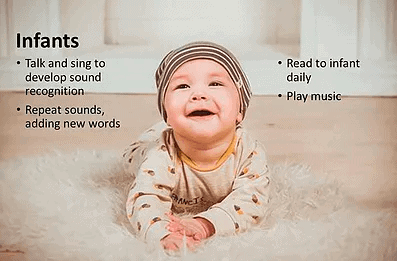 Infants:
Infants:
Children in infancy (ages 0 to 1-year-old) focus their vision, explore, and learn about their environment. Ways to help promote brain development in this age group include talking and singing to the infant. Repeating sounds that the infant makes and then adding additional words will help with language development. For example, if an infant cues “aah” before a feeding, you can say “Yes, aah you want the bottle.” Reading to infants also helps them develop an understanding of sound. It is recommended a baby be read to at least once a day.
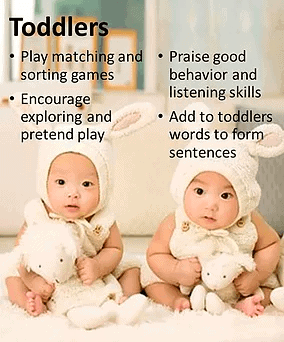 Toddlers:
Toddlers:
As a child becomes a toddler (ages 1 to 3 years old), you should engage in playing games that will develop their curiosity. A great game to play is to ask the child to name different body parts. My daughter loves playing this game and we started when she was a year old by asking, “Where is your nose?” She would point to her nose and try to repeat the word ‘nose’. Little by little, we added body parts as we played the game. At 19 months, she can point to and say all her body parts.
Other games to play during this age are matching and sorting games. These include sorting different shapes and even solving big, simple jigsaw puzzles. Encourage exploring new things in different surroundings by going to a park or on a walk. Continue to increase language capacity by adding to the words toddlers say to form short sentences. This is also a great time to let the toddler help with dressing and feeding himself or herself. Praising good behavior and listening will help build confidence and encourage children to keep trying. As the toddler gets older, try to read a book at a certain time of day; for example, before bedtime. This start building routines.
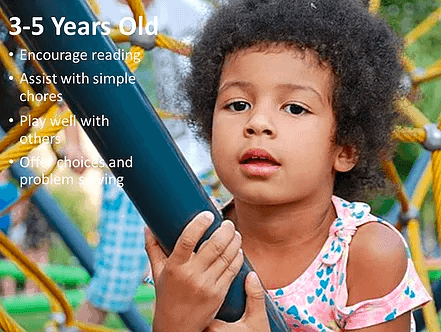 3-5 Year Olds:
3-5 Year Olds:
The best time to enforce encouragement of reading is when a child grows out of being a toddler into a young child or preschool child. If you haven’t started yet, take the child to the library. Also, allow the child to assist with simple chores such as folding clothes. Now is also the time to start promoting sharing and building friendships by encouraging the child to play with others. When the young child has a problem, try and walk through the steps to overcome it so they learn basic problem-solving skills.
Make sure you speak to the child in complete sentences as this will help foster good language skills. Avoid speaking in baby talk. For example, if a child says, “Me played with doll and white blanket”, respond by saying “Oh, you mean you played with your doll and her little blanket?”
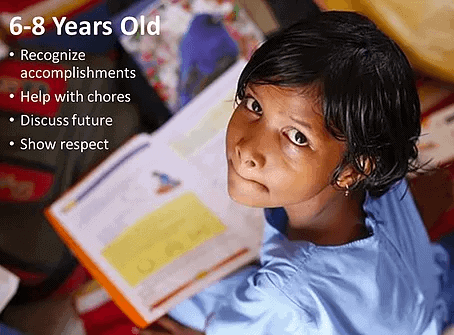 6-8 Year Olds:
6-8 Year Olds:
Between the ages of 6 and 8 years old, independence becomes even more important. During this age, show the child affection by recognizing even small accomplishments. “Talking” with the child is the theme for this age. Help the child develop a sense of responsibility by allowing them to assist with tasks around the home. Talk with the child about things to look forward to and about the future.
This age is a great time to discuss the importance of respecting others and encourage helping others in need. Volunteering teaches compassion, empathy, and community responsibility. It is also important at this age to teach patience. For example, let someone other than the child go first when playing a game or waiting in a line.
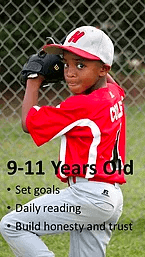 9-11 Year Olds:
9-11 Year Olds:
Between the ages of 9 and 11, peer pressure becomes more influential. Children of this age start gaining a sense of responsibility, so it is important to talk about the accomplishments and challenges that they are facing or have faced. Help the child set goals in various areas of their life; for example, getting a better grade on the next English test. Continue to encourage the child to read every day and talk about homework. It is important to be honest with the child so that you can build trust with the child.
According to the American Academy of Pediatrics, “Promotion of optimal early brain and child development is essential to the health and well-being of children.” As we interact with children during our normal daily activities, we often don’t think about how our actions can impact their development. Simple things like singing to a child in the car or reading to a child each night can have dramatic impacts on the child’s brain development. Be aware of how you interact with children of varying ages and recognize what an important influence you can be in their lives.
To learn more, a Brain Development course is available with enrollment in the Professional Childcare program.
About the Author: Elena Borrelli has a Master of Science in Physician Studies from the University of Detroit, Mercy and a Bachelor of Science in Biology from Oakland University. She is a Licensed Physician Assistant, Online Academic Medical Advisor, and Founder of Family Branches, a non-profit organization for underprivileged children.


Recent Comments